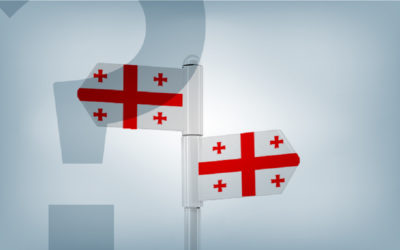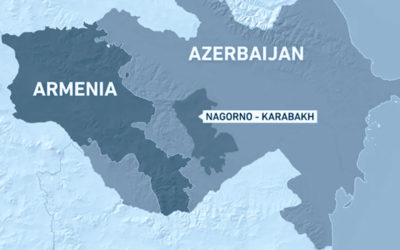 Loading...
Loading...-
The political climate in Georgia teeters on the edge of a dangerous precipice. On 14th of May, the ruling Georgian Dream party passed the “Law on Transparency of Foreign Influence”, a measure reminiscent of Kremlin-style governance.
Widely referred to as the “Russian Law” and “Foreign Agents Law”, it has faced strong opposition both domestically and internationally, casting a dark cloud over Georgia’s democratic aspirations and its pursuit of closer ties with the European Union. This law was hastily pushed through in a parliamentary session lasting just a minute and a half, amidst chaotic scenes within and outside the parliament building, where riot police used tear gas to disperse protesters and MPs engaged in physical squabbles.
What is wrong with the law?
The law’s adoption isn’t inherently hazardous, aside from its problematic wording and several objectionable clauses. In fact, in a well-established democracy, a revised version of this law might even prove beneficial. Yet, without the essential checks and balances, and with a judiciary that is subordinate to an overly dominant executive branch, this legislation could easily lay the foundation for oppressive measures, much like those seen in Russia.
Although the term “agent” has been removed, the newly named “Law on Transparency of Foreign Influence” retains problematic elements that could be exploited to suppress critical voices. Organisations receiving more than 20% of their funding from foreign sources are required to register as “organisations serving the interests of a foreign power.” This stipulation not only stigmatises these groups but also threatens to polarise Georgian society, fostering divisions and radicalisation.
Particularly alarming is Article 8 of the law, which grants the government extensive powers to interfere in the activities of these organisations without clear mandates or oversight. This could lead to an abuse of power reminiscent of authoritarian regimes. The Minister of Justice is empowered to monitor these organisations based on very broad criteria, including potentially any statement from virtually any individual, infringing on privacy and setting a dangerous precedent for data protection rights violations.
The timing is also perilous
The enactment of this law comes at a critical moment in Georgia’s domestic politics and its relations with the EU. Having been granted EU candidate status in December 2023, Georgia was poised to make significant strides toward EU membership—a goal that seemed almost unattainable just a few years ago. This year, by meeting the EU’s conditions, Georgia could realistically expect to have a fair opportunity to begin accession talks. However, with the current law, the chances of advancing to open accession talks remain slim, as the likely consequences of the law will endanger the nine steps required for progress, which include the protection of human rights and the freedom of civil society and media.
With parliamentary elections scheduled for October, the ruling party’s anti-western stance and the enactment of this legislation could significantly impact their popularity. Yet, it remains uncertain whether they will be decisively defeated and replaced by a coalition government. The hope lies with the opposition and the revitalised civil society and youth movements, which have positioned EU integration as a pillar of their national identity and struggle.
How should the EU respond?
The European Union faces a complex dilemma. Harsh measures such as halting visa liberalisation or revoking Georgia’s candidate status might alienate the Georgian people and strengthen the government’s narrative that the EU is shutting its doors. On the other hand, a softer approach could allow authoritarian tendencies to further entrench themselves.
One could observe that Joseph Borrell, EU Foreign Policy Chief, underlined this dilemma in today’s statement. While criticising the law’s spirit and content as contrary to EU norms, the EU has not yet announced concrete actions against Georgia. A possible response could include targeted personal sanctions against key figures who perpetuate anti-democratic policies. Additionally, the EU could amplify its support for judicial reforms, aiming to develop a judiciary capable of acting as the last bastion against authoritarianism and poor governance.
As Georgia stands at this pivotal moment, the EU’s involvement is more crucial than ever. Beyond sanctions and structural reforms, the EU should spearhead an effective and strategic information campaign to better elucidate its positions on key issues affecting Georgian society. This would aid not only Georgia but also serve as a model for how the EU engages with other candidate countries facing similar challenges.
Georgia’s path toward EU membership is fraught with obstacles, yet with strategic engagement and support from the EU, combined with the unabated enthusiasm of the Georgian population to fight for EU ideals, the only way forward for Georgia remains firmly oriented towards Europe.
Teona Lavrelashvili Democracy Eastern Partnership Values

Teona Lavrelashvili
Quo Vadis, Georgia?
Blog
15 May 2024
-
One can only be deeply moved by the sight of exhausted Armenians, fleeing Nagorno-Karabakh in droves. Over a hundred years after the Armenian genocide (perpetrated by the Young Turks in 1915-1917, though still not officially acknowledged by Türkiye), and the establishment of the first Armenian state in 1918, the lightning Azeri offensive forced the so-called “Republic of Artsakh” to capitulate to Baku. The 30-year-old republic will officially cease to exist on January 1, 2024.
Up until this point, more than 100,000 of its 120,000 residents have crossed the border into the Republic of Armenia through the Lachin corridor, the only passage connecting Nagorno-Karabakh with Armenia. Armenian Prime Minister Nikol Pashinyan has characterised this humanitarian crisis as an ethnic cleansing orchestrated by Baku. Azeris vehemently deny these allegations, emphasising the humanitarian aid provided to the remaining Armenians, while promising them the same rights as other Azerbaijani citizens.
The fear of living under Ilham Aliyev’s authoritarian regime, coupled with the deep-seated historical enmity between the two nations, has left Karabakh Armenians with very few options. All of this appears to be a natural progression following the ten-month blockade of the Lachin corridor, which deprived Nagorno-Karabakh and its people of essential supplies. The international community has not only failed to reverse the course of this siege but, worse yet, has fallen short in reassuring its population about its future.
The usually vocal and justly assertive EU in defending human rights and opposing any form of violence has, this time, chosen to remain silent. Only the European Parliament managed to raise a strong voice and condemn Azerbaijan. The crucial energy partnership, though, between Brussels and Baku diminishes the possibility of taking harsh measures against Azerbaijan’s aggression. On the other side of the Atlantic, Washington does not appear willing or able to risk direct involvement in the region, offering only general statements about “restraining further hostilities and engaging both parties in finding a lasting and sustainable peace agreement.”
Meanwhile, Russia, the most significant third-party actor in the region with troops on the ground, has done little to halt the Azeris. Moscow, deeply embroiled in its own war in Ukraine, was unwilling to support a country whose leadership repeatedly displayed signs of “disobedience”. Yerevan’s decision to condemn Russia’s attack on Kyiv and its recent alignment with the International Criminal Court in prosecuting Putin has outraged the Kremlin. Even if the Russians aim to appear as peace brokers in the Caucasus, their inaction has clearly undermined their role and presence there.
But who truly benefits from the current situation in the South Caucasus? Undoubtedly, Azerbaijan, capitalising on its rapid economic growth and geopolitical position, has built a robust military and, by forging the right alliances, launched an attack on Nagorno-Karabakh in 2020. Their strategic goal of erasing the Armenian presence in the enclave was achieved with the second operation on September 19. However, this may not be the end of this long-standing conflict. Aliyev openly shares Turkish President Erdoğan’s grandiose idea of “one nation, two states” and envisions Türkiye as the mother and protector of all Turkic peoples.
Ankara has established a foothold in the Caucasus, and Turkish aspirations for an expanded sphere of influence from the Balkans to Central Asia seem promising. One of the last obstacles to this is southeastern Armenia, a narrow strip of land dividing Nakhichevan (West Azerbaijan) from the eastern part of the country. Azerbaijan has already threatened Armenia with the use of force if the “Angezur/Meghri corridor” does not open, disregarding Western appeals and Iranian warnings not to challenge the latter’s sovereignty.
It is concerning that the West appears comfortable with the two Turkic states acting as a bulwark against Russian expansion in the region. However, unchecked Turkish influence in the wider region may be difficult to restrain later, especially given Erdoğan’s unreliable relationship with the West over the past decade.
Israel, especially in light of the recent terrorist attacks within its territory, is poised to leverage its longstanding support for Azerbaijan. The latitude granted to its intelligence services to operate near the Iranian borders could potentially prove crucial in the event of a confrontation with Iran. In contrast, Tehran’s vocal support for the Armenians has proven to be ineffective. The situation may worsen for the Islamic Republic if Baku follows through with its corridor threats, cutting off Iranians not only from Armenia, but subsequently from their closest ally, Russia.
However, no matter how painful the situation is for the Armenians, the party due to receive the most blame for the current, dire situation of the “Artsakh” is the shortsighted leadership in Yerevan over the years. They proved incapable of keeping up with the developments and dynamics in their own neighbourhood and the wider world over the past three decades. Their heavy reliance on Russia, who has cleverly cultivated the myth of being the protector of Caucasus Christians, was revealed to be fragile. After the 2018 Armenian Revolution, the shift towards the West was sudden, unprepared, and without a deep assessment of the risks involved.
The Armenian exodus does not mark the end of the conflict. The complexity of Armenian-Azeri relations and the involvement of additional actors compared to the past create an explosive mix. The West, in general, needs to determine whether the protection of human rights and liberal democracy outweighs the allure of cheap natural gas prices. Armenia’s accession to NATO would have been a good first step in stabilising the region. Otherwise, it is only a matter of time before a new spark ignites the entire region once again.
Panos Tasiopoulos Eastern Partnership EU-Russia Foreign Policy

Panos Tasiopoulos
After the World’s Crocodile Tears for Armenians, What Next for the South Caucasus?
Blog
09 Oct 2023


